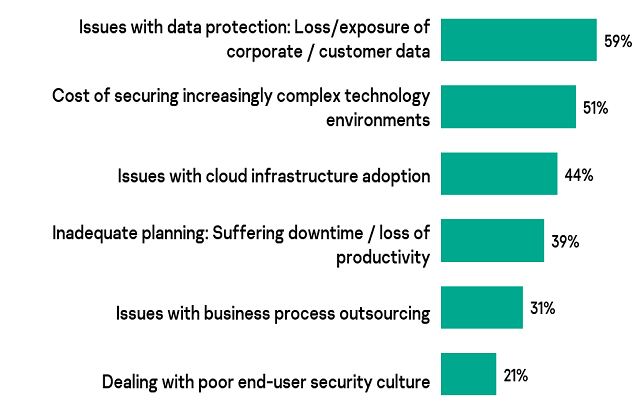Data leakages of internal systems caused either by cyberattacks (29%) or employees (25%) are the most concerning security issues encountered by SMEs and enterprises, according to the Kaspersky IT Security Economics survey respondents from Asia Pacific (APAC).

Heightened concerns over data protection increasingly also turn business leaders’ attention to the transparency policies of their suppliers, the company also said.
Global digitalization has inevitably led to massive amounts of data being shared and stored online. According to the latest estimates, the volume of data generated, consumed, copied, and stored is projected to reach more than 180 zettabytes by 2025. However, more and more people question companies’ ability to keep their data secure which leads to a decline in confidence in business.
Kaspersky’s global research, conducted among 834 IT decision-makers from APAC, shows a loss or exposure of corporate and customer information because of a data breach is a major headache for companies – 59% of respondents from organizations of all sizes named this issue the most challenging aspect related to IT security.
Among others, the most common concerns are the cost of securing increasingly complex technology environments, and issues with cloud infrastructure adoption with 50% and 44% share, respectively.
Thinking more specifically about the most disturbing security challenges, APAC respondents mostly indicated leakage of data from internal systems caused by cyber-attacks (29%) and by employees (25%). Most decision-makers are also concerned about incidents affecting IT infrastructure hosted by a third-party noted by 28% and managing security across different computing platforms (25%).
“The uniqueness of IT infrastructure in APAC is highlighted by this latest survey. Globally, identifying vulnerabilities in internal IT systems is among the top three concerns of decision-makers,” Chris Connell, managing director for Asia Pacific at Kaspersky, said.
“Here in APAC, we see that third-party inflicted incidents are actually second-most concerning for local executives. This is driven by the interconnectedness of businesses here and we see outsourcing and managed services to continue to be preferred due to the efficiencies and cost-saving opportunities they bring to the table.”
Given that data protection has turned into the most alarming business security issue, companies are now attaching considerable importance to their suppliers’ and contractors’ transparency policies. Of those questioned, almost all (98%) in APAC consider the presence or absence of transparency policies as important for going into business with a supplier or contractor.
And while 88% of surveyed organizations here already have transparency policies in their organizations, 91% confirmed their readiness to invest resources in developing it further.
“Today, we see organizations are being more conscientious when it comes to data security and that a responsible approach towards data management is becoming essential when considering suppliers and contractors. To help their customers and partners ascertain that the required standards for ensuring data security are applied, more and more companies are adopting transparency policies,” Yuliya Shlychkova, head of public affairs at Kaspersky, added.




